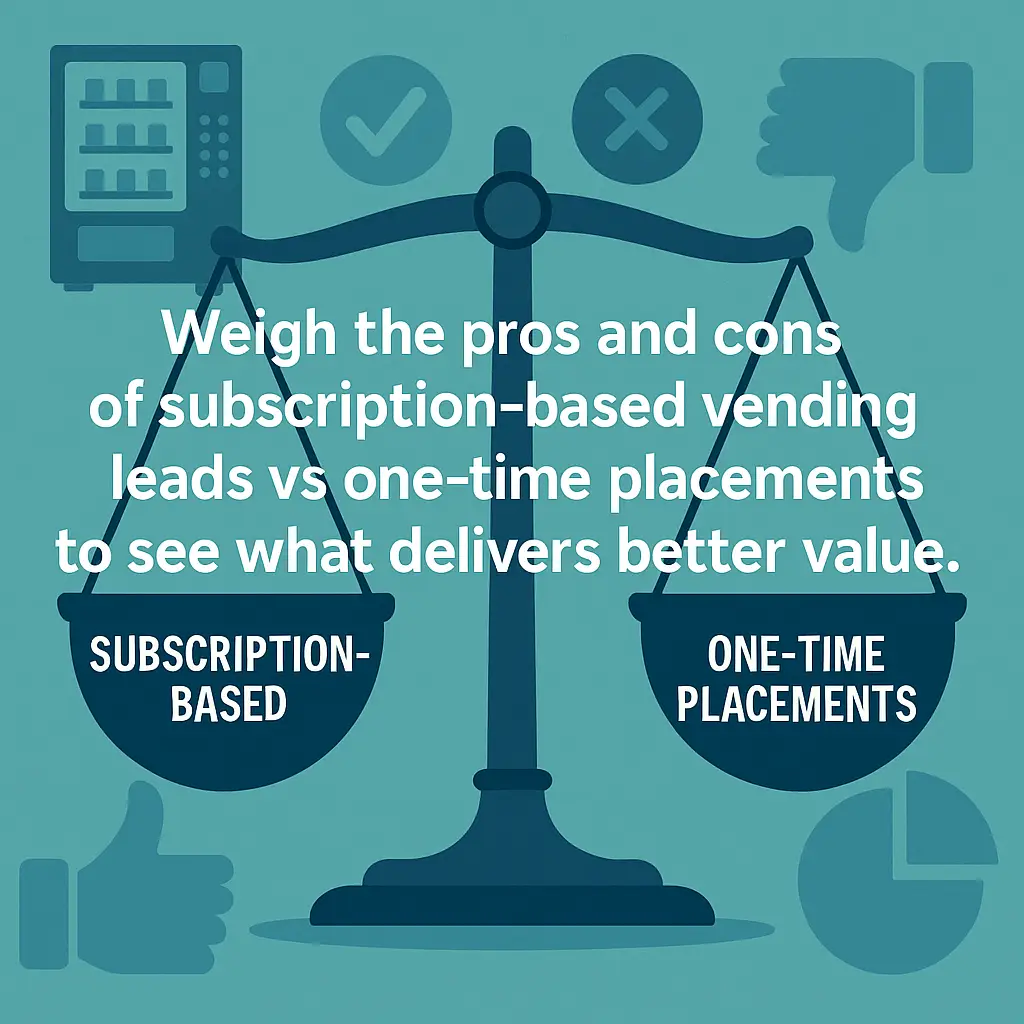Is It Worth Paying Monthly for Leads?
Weigh the pros and cons of subscription-based vending leads vs one-time placements to see what delivers better value.
Back to Vending Machine Locators ResourcesWeigh the pros and cons of subscription-based vending leads vs one-time placements to see what delivers better value.
Back to Vending Machine Locators ResourcesStart your 30-day free trial and get instant SMS and email alerts whenever a local business needs vending service. These are real location leads to help you grow your route — you decide which ones to buy, no obligations or contracts.
![]() Pay-per-lead models minimize financial risk for new operators
Pay-per-lead models minimize financial risk for new operators
![]() Low-quality leads harm time and resource efficiency
Low-quality leads harm time and resource efficiency
![]() Some monthly services limit geographic filtering or lead preferences
Some monthly services limit geographic filtering or lead preferences
30 days free, then $39 / month.
No Commitment. Cancel Anytime.

Deciding whether to pay monthly for vending leads comes down to value and flexibility. Many vending operators turn to lead subscription services with the hope of getting consistent placements. However, these monthly models can have hidden downsides—such as limited customization, mixed lead quality, and inflexible contracts.
With monthly lead services, operators generally pay a flat fee for access to a predetermined number of potential business locations. While this model provides predictability, it doesn’t always guarantee results. In many cases, operators report leads that are outdated, outside their geographic range, or not actively seeking vending services. The result: wasted money and time chasing cold or poor-fit prospects. Without knowing what you're getting beforehand, it's difficult to evaluate return on investment.
In contrast, pay-per-lead models offer more precision. You can review opportunities and only purchase those that align with your specific location, machine type, or service capabilities. This reduces risk and lets you tailor your growth to your capacity. Vendors have control—no monthly commitment and no paying for leads that don't make sense.
For newer operators, this can be especially beneficial. Rather than being locked into a plan, you can scale your leads at your own pace. You avoid overextension and still build your route with verified businesses that are requesting service. Plus, one-time lead models often deliver leads faster than platforms waiting to “allocate” included monthly leads.
When evaluating which lead strategy is right for you, consider your route stage, service area, and machine inventory. Subscription models may suit larger operators looking for volume—but for most, one-time vending leads offer better control and transparency.
Learn what kind of route size supports profitability or see why many retirees opt for flexible vending income.
Vending Exchange connects vending operators with real businesses actively looking for vending services—including traditional machines, AI coolers, and office coffee. Get instant SMS and email alerts when new opportunities are available in your area. No contracts or monthly fees—just buy the leads you want. Start your free 30-day trial today and grow your vending business on your terms.
They can be, but often depend on lead quality and your ability to service them effectively.
You may still be charged the full monthly fee even if lead volume is low.
Some services don't let you filter leads in advance, reducing control over your target area.
Yes, pay-per-lead offers more flexibility and reduces upfront financial risk for startups.
Most subscriptions do not refund for poor leads, though some may replace invalid ones.
It depends on the provider—some require a contract while others offer month-to-month options.
Not always with monthly models, whereas pay-per-lead services often give those details upfront.
Some do, but the quality control varies. Ask how leads are sourced and verified.
It varies widely—some services offer 2-10 leads monthly, depending on area demand.
Paying for access that doesn't translate into actual placements or revenue for your business.